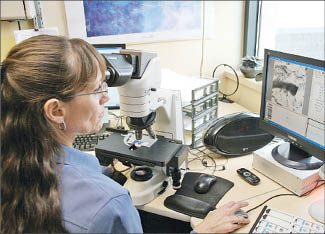
Home » Valley lab aims to increase volume
Valley lab aims to increase volume
InCyte using merger, investments in technology to extend its market reach, fend off competition

October 25, 2012
Spokane Valley-based InCyte Pathology PS, which has enjoyed steady growth through the recession, plans to accelerate that growth by expanding into a regional practice, which would give it greater resources to remain competitive with national and niche labs, says Gary Gemar, InCyte's chief operating officer.
InCyte, a longtime anatomical diagnostic laboratory, provides tissue and cell testing to hospitals in Eastern Washington and North Idaho and physicians' offices in Washington, Idaho, Montana, and Alaska.
The practice, based in a 26,000-square-foot lab and office building in the Mirabeau area, at 13103 E. Mansfield, has 145 employees, including 25 pathologists, who diagnose diseases based on cell and tissue samples that come in from doctor's offices and hospitals, Gemar says.
InCyte expects to complete a merger with Bellevue-based Eastside Pathology Inc. early next year, which will bring its combined total workforce to 206 employees, including 36 pathologists, he says. When the merger is complete, the 20 pathologists who own InCyte and 11 pathologists who own Eastside Pathology will own the combined practice.
InCyte doesn't disclose its revenues, but they've been on a steady upward trend, Gemar says.
"We've had good growth in the 3 to 5 percent range," he says. "We were growing and hiring through the recession."
The practice handles about 500 to 800 samples a day through its cytology and histology divisions, and its 22-person billing department processes 225,000 billings a year.
Eastside Pathology, the lab merging with InCyte, provides anatomical and clinical pathology services to Overlake Hospital Medical Center, in Bellevue; Valley Medical Center, in Renton; and physicians' offices throughout the Puget Sound area. Eastside Pathology eventually will take on the InCyte name after the merger is complete.
InCyte hasn't waited to complete the merger, though, to update some of its technology.
The practice recently installed a "location-guided" Pap-test screening system in which computer-driven microscopes are electronically linked to its slide profiler.
A Pap test, or smear, is cell sample taken from a patient's cervix and mounted on a glass slide to be viewed through a microscope to check for the presence of abnormal cells that could lead to cancer.
The newly enhanced Becton Dickinson Focal Point GS imaging system at InCyte uses an onboard bank of computer processors to identify fields of view with the highest probability of abnormal cells on a test slide, Gemar says. Each field of view can contain hundreds of cells.
A cytotechnologist views the identified fields through a microscope before viewing the rest of the sample on the slide, all with the aid of the computer-guided system. If the cytotechnologist identifies abnormal cells, the slide is referred to a pathologist for a diagnosis.
"From a management perspective, I feel it improves efficiencies by reducing turnaround time and enabling cytotechs to view more cases, increasing volume," Gemar says of the new system.
The volume of Pap tests analyzed at InCyte has held steady despite a change in national guidelines that now recommend that most healthy women with no previous abnormal results undergo Pap tests no more than once every three years. The conventional recommendation had been for annual Pap smears.
"That's going to change the volume," Gemar says.
InCyte, however, does a lot more than handle Pap smears.
"The tissue side is continuing to grow," Gemar says, especially as InCyte expands its relationships with hospitals.
InCyte has contracts with two dozen hospitals and labs, including Providence Sacred Heart Medical Center & Children's Hospital and Providence Holy Family Hospital, in Spokane; Valley Hospital, in Spokane Valley; and Kootenai Medical Center, in Coeur d'Alene.
InCyte acquired Davis-Sameh-Meeker Laboratories, in Walla Walla, last year, picking up a lab, two pathologists, and contracts with Providence St. Mary Medical Center, Walla Walla General Hospital, and the Veterans Affairs Medical Center there.
The merger with Eastside Pathology will give InCyte a foothold in the Seattle market, which has been a long-term vision for the practice, Gemar says.
Another driver behind the merger is an increase in requests for tissues samples to be viewed by subspecialists, he says.
The merger will broaden the depth of the 27 subspecialties offered through its InCyte's pathologists, Gemar says. Subspecialties include expertise in such interests as head and neck pathology, gynecological pathology, gastrointestinal pathology, and dermatopathology.
"If we receive tissue from a dermatologist, the dermatologist wants a specialist in reading derm cases," he says.
Once the merger is complete, the combined practice will have more buying power to invest in molecular and genetic testing equipment that will help ensure that InCyte stays competitive, Gemar says.
Such equipment can cost hundreds of thousands of dollars, he says.
"We need volume," Gemar says. "With two groups and a growing market share, it helps keep costs down."
Many molecular tests, though, are conducted by national labs that have more equipment, or by specialty labs that develop proprietary tests, he says.
"We're constantly getting competition from specialty or niche labs that come up with a molecular test that they market directly to physicians," Gemar says.
Consequently, the practice has developed its own 10-person sales staff.
InCyte also plans to acquire digital scanners that eventually could take the place of microscopes.
Once tissue is prepared on a slide and scanned and digitized, the resulting images can be read on a computer screen anywhere in the world, Gemar says.
The images will aid in rapid consultations, because pathologists will be able to review a case in moments instead of waiting for delivery of slide samples, he says.
"In the next five to seven years, the pathologist might give up the microscope, and the pathologist's desk in the future will have three computer screens in its place," Gemar says.
Special Report
Related Articles





![Brad head shot[1] web](https://www.spokanejournal.com/ext/resources/2025/03/10/thumb/Brad-Head-Shot[1]_web.jpg?1741642753)